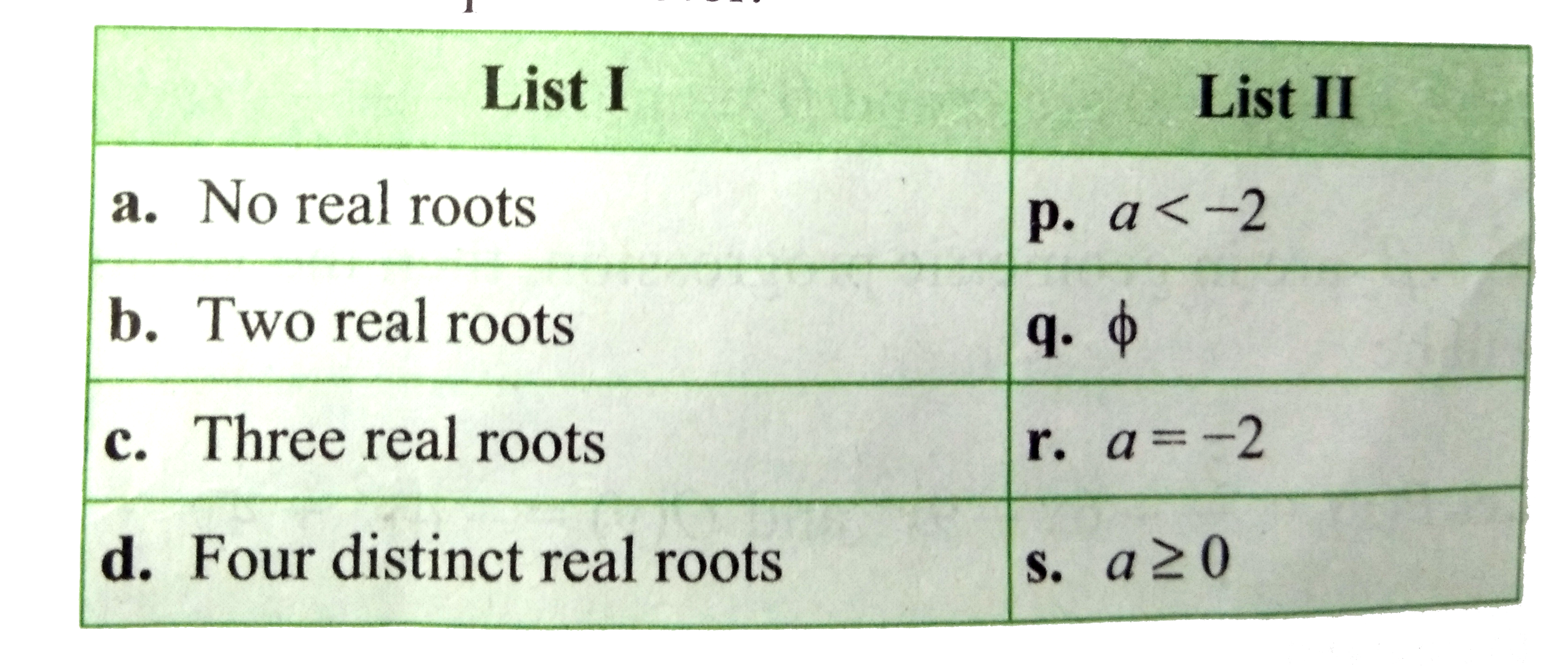If every pair of equations x2+ax+bc=0,x2+bx+ca=0 and x2+cx+ab=0 has a common root then their sum isSolution in Tamil
the sum of the three common roots is −(1/2)(a+b+c)
the sum of the three common roots is 2(a+b+c)
one of the values of the product of the three common
roots is abc
the product of the three common roots is a2b2c2
The correct Answer is:1,3
Since each pair has common root, let the roots be α,β for
Eq(1), β,γ for Eq. (2) and γ,α for Eq (3). Thereofore,
α+β=−a,αβ=bc
β+γ=−b,βγ=ca
γ+α=−C,γα=ab
Adding, we get
2(α+β+γ)=−(a+b+c)
⇒α+β+γ=−12(a+b+c)
Also by multiplying product of roots , we have
α2β2γ2=a2b2c2orαβγ=abc .
Topper's Solved these Questions
- THEORY OF EQUATIONSBook:CENGAGEChapter:THEORY OF EQUATIONSExercise:Exercise (Comprehension)
Explore 37 Videos
- THEORY OF EQUATIONSBook:CENGAGEChapter:THEORY OF EQUATIONSExercise:Exercise (Matrix)
Explore 6 Videos
- THEORY OF EQUATIONSBook:CENGAGEChapter:THEORY OF EQUATIONSExercise:Exercise (Single)
Explore 89 Videos
- STRAIGHT LINESBook:CENGAGEChapter:STRAIGHT LINESExercise:JEE Advanced Previous Year
Explore 4 Videos
- THREE DIMENSIONAL GEOMETRYBook:CENGAGEChapter:THREE DIMENSIONAL GEOMETRYExercise:Question Bank
Explore 12 Videos
Similar Questions
Consider an unknow polynomial which divided by (x−3) and (x−4) leaves remainder 2 and 1, respectively. Let R(x) be the remainder when this polynomial is divided by (x−3)(x−4).
If equations R(x)=x2+ax+1 has two distint real roots, then exhaustive values of a are.
View SolutionMatch the following for the equation x2+a|x|+1=0 where, a is a parameter.

View SolutionThe value of expression x4−8x3+18x2−8x+2 when x=2+√3
View Solutionabout to only mathematics
View SolutionThe equation of the plane which has the property that the point Q(5,4,5) is the reflection of point P(1,2,3) through that plane, is ax+by+cz=d where a,b,c,d∈N. Find the least value of (a+b+c+d).
View SolutionIf x2+ax+bc=0andx2+bx+ca=0(a≠b) have a common root, then prove that their other roots satisfy the equation x2+cx+ab=0.
View Solutionif each pair of the equation x2+ax+b=0,x2+bx+c=0andx2+cx+a=0 has common root, then product of all common root is
View SolutionIf the quadratic equations x^(2)+bx+ca=0&x^(2)+cx+ab=0 (where a!=0 ) have a common root.prove that the equation containing their other root is x^(2)+ax+bc=0
View SolutionIf every pair of equations x^(2)+ax+bc=0,x^(2)+bx+ca=0 and x^(2)+cx+ab=0 has a common root then their sum is
View SolutionProve that , if the equations x2+bx+ca=0 and x2+cx+ab=0 have only non-zero common root then their other roots satisfy the equation t2+at+bc=0.
View SolutionIf the equation x2+bx+ca=0 and x2+cx+ab=0 have a common root and b≠c, then prove that their roots will satisfy the equation x2+ax+bc=0.
View SolutionIf x2+bx+ca=0,x2+cx+ab=0 have a common root then their other are the roots of the equation
View SolutionIf every pair from among the equations
x2+ax+bc=0,x2+bx+ca=0,x2+cx+ab=0 has a common root, then the sum of the three common roots is
View SolutionIf the equations x^(2)-ax+bc=0 and x^(2)+bx+ca=0 have a common root, then a + b + c =
View SolutionIf the equation x^2+ax+bc=0" and " x^2-bx+ca=0 have a common root, then a+b+c =
View Solution